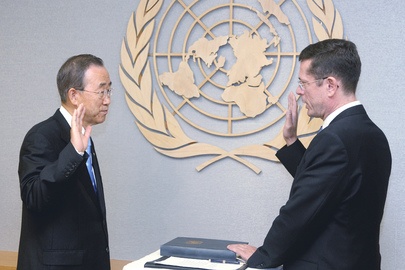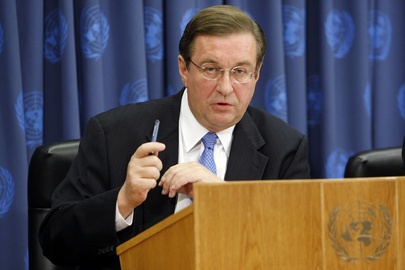

The United Nations has launched a set of rule of law indicators designed to help post-conflict and other countries in transition to strengthen governance through efficient administration of justice, effective policing and proper management of correctional institutions. The UN Rule of Law Indicators, developed by the Department of Peacekeeping Operations (DPKO) and the UN Office of the High Commissioner for Human Rights (OHCHR) in partnership with other UN entities, consist of 135 indicators for the police, the judiciary and correctional facilities.
“These indicators, plus implementation guide and related tools, were developed after implementation on a pilot basis of an earlier set of indicators in Haiti and Liberia,” Dmitry Titov, Assistant Secretary-General for Peacekeeping Operations, (BOTTOM PHOTO), said at news conference at UN Headquarters. The indicators launched today will first be implemented in Haiti and Liberia.
They are designed to “highlight apparent successes and shortcomings within institutions and to monitor changes over time within countries,” Mr. Titov said, adding that the indicators are not intended to support direct comparisons between States or rank them. The document that lays out the indicators defines rule of law as a “principle of governance in which all persons, institutions and entities, public and private, including the State itself, are accountable to laws that are publicly promulgated, equally enforced and independently adjudicated, and which are consistent with international human rights norms and standards.”
Ivan Šimonovic, Assistant Secretary-General for Human Rights, (TOP PHOTO with UNSG Ban), stressed that rule of law is a precondition for the UN key pillars of peace and security, development and human rights, and described the indicators as a “powerful diagnostic instrument” to measure performance, capacity and integrity of rule of law as a tool of governance. Beneficiaries of indicators include governments, which can use them to identify where reforms are needed and measure their successes, as well as civil society, the media, non-governmental watchdogs and donors. “The very ambitious goal would be to have all relevant rule of law areas covered and hopefully to have the widest possible coverage of countries under our review,” Mr. Šimonovic added.
By Ambassador Muhamed Sacirbey
Facebook Become a Fan at “Diplomatically Incorrect”
Twitter – Follow at DiplomaticallyX
Related Reports – “War Crimes Justice” Channel -
diplomaticallyincorrect.org/c/war-crimes-justice



